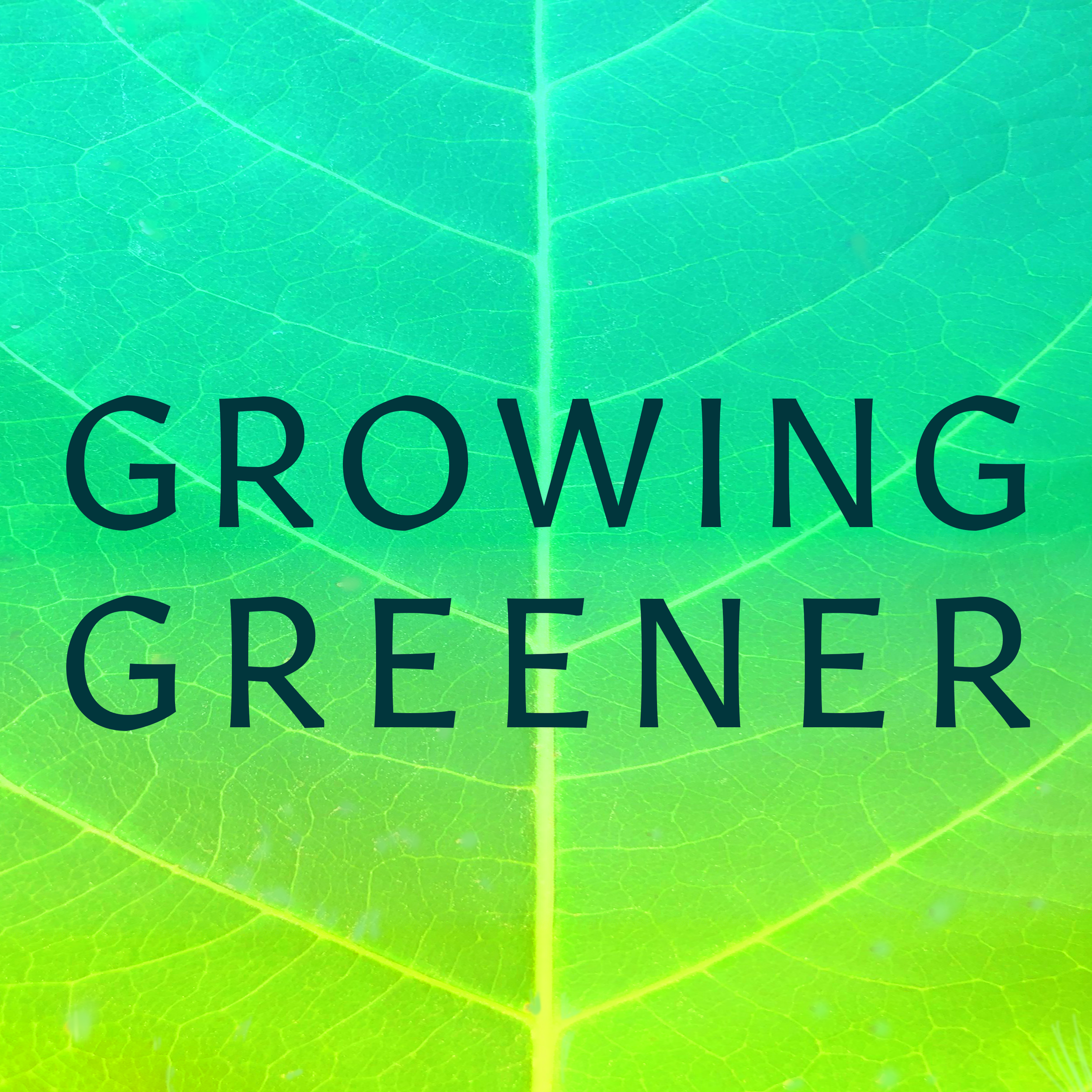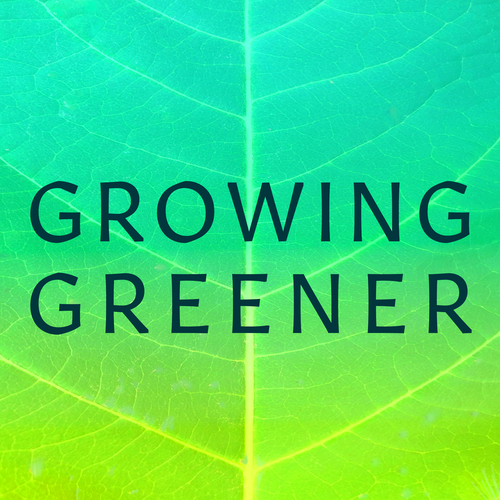Subscribe to our new podcast!

Environmental challenges are the defining crisis of our age. Addressing them, I believe, begins at home, literally in our own backyard. In my Growing Greener podcast, I share interviews with gardening experts who are also leaders in working and living in harmony with nature.
Join us every week for a different perspective on how to make your personal landscape healthier, more beautiful, more sustainable, and more fun. Click on the links below to download individual programs, or on one of the buttons above to subscribe so that the program is automatically delivered to your device every Wednesday.
You can also hear us live every Wednesday evening from 6:00 - 6:30 at 88.1 or online at wesufm.org. If you have suggestions or questions about what you hear on the program, please send them to me via my contact page, and I will try to answer them here.
If you’re seeking an earlier episode not listed below, you will find it on Growing Greener in your favorite podcast app.
The National Plant Germplasm System has protected U.S. farmers against crop diseases and now climate change for over a century; DOGE has defunded its $40 million annual budget, imperiling our $1.5 trillion food system
Award-winning landscape architect Michael Geffel describes how he used precisely targeted and timed mowing to convert a brownfield into a flowering grassland and a vibrant public recreation area.
Slugs are the Rodney Dangerfield of garden wildlife – our only interest is in exterminating them. Yet as Dr. Jann Vendetti of the Los Angeles County Natural History Museum explains, they lead fascinating and, in many ways, very useful lives
Gardeners complain about clay soils, but Benjamin Vogt, a leading designer of natural gardens and landscapes notes that they offer many advantages for the ecologically based gardener
Shannon Currey, head of education and outreach for Izel Native Plants, shares how that transformative plant clearinghouse is as committed to the education of its customers as to providing them with biodiverse bargains
Brandon Carbary’s pre-designed garden templates, shipped complete with plants, makes creating a locally adapted, aesthetically attractive display of native plants almost effortless
Ethan Kauffman, Director of Stoneleigh, describes the 9-year process his team has pursued, enriching a classic Philadelphia Mainline estate with thousands of species of native plants, to transform it into a model for how to honor traditional landscape aesthetics while boosting biodiversity and serving the local ecosystem
Starting vegetable and annual seedlings indoors is a skill every gardener needs to master and Dr. Steve Reiners of Cornell University shares tricks of the trade. Grow your own locally adapted, disease-resistant cultivars for bigger harvests, better flavors, and a more resilient garden.
Judge’s Farm Nursery is the newest venture in the Griswold family’s 385-year association with their homestead at the mouth of the Connecticut River. Co-founder Matt Griswold describes the nursery’s program of growing native plants sustainably from locally collected seeds.
Aaron von Frank discusses his book, “The Impractical Guide to Keeping Pet and Backyard Ducks” and details the services a flock can provide in controlling weeds and pests, as well as furnishing a supply of eggs and fertilizer.
That bouquet of flowers you buy at the supermarket has a huge, unsustainable carbon footprint. Join Debra Prinzing, founder of the Slow Flowers Society, for tips about sourcing locally grown flowers or growing your own year round for unique, locally rooted, and sustainable beauty.
It’s not an either/or choice, native vs. introduced, for Claudia West of Phyto Studio when this leader of the ecological gardening movement develops a plant palette for one of her innovative landscapes. What she seeks, besides selections that serve the customers’ needs and delight the eye, are “high performing” species and cultivars that provide maximum benefits to the local ecosystem, regardless of place of origin.
“Your Natural Garden,” Kelly D. Norris’ new book, is sure to be one of the most essential gardening tools of 2025. In this beautifully illustrated guide, Norris, who split his childhood between working in his grandmother’s garden and exploring the 40-acre prairie a quarter mile up the road, shares insights he has gathered from his hands in the dirt-experience, studies of plant science, and his work as a nationally renowned ecological garden designer.
Sports fields and swimming beaches are essential, but public parks can also play a crucial role in maintaining biodiversity. As Curator of Natural Resources for the Westchester County New York Park system, Leah Cass designs management regimes for thousands of acres of habitat, coordinating the needs of residents, wildlife, and more than a thousand species of native plants.
Are you dreaming of a white Christmas? Or a snowy Hanukkah or Kwanzaa? Or just a personal celebration of the winter solstice? EcoBeneficial designer and educator Kim Eierman will share you the many gifts that a blanket of snow gives to the garden.
Gardeners mostly didn’t focus on our native plants as such in 1988 when Steve Castorani and Dale Hendricks founded North Creek Nurseries to propagate them in bulk for distribution to retail nurseries. Learn how North Creek’s innovations in the years since have continued to shape and expand the native plants movement.
Creating a native lawn, Dave Kaplow says, may require no more than a change in maintenance regimes. And, the ecological restoration pioneer adds, it provides a biodiverse and sustainable turf that is friendly not only to people but also wildlife
Brother James Lockman of the Franciscan Order, whose personal ministry is ecological restoration, discusses the nature-embracing spirituality of St. Francis of Assisi, founder of his order, and how it has inspired the ecological activism of the current Pope
When Carol Bouska and her siblings inherited the family farm in Iowa, they seized the opportunity to commit to restoring the soil, enhancing wildlife habitat, and bolstering the community in which they had grown up – and used this process to reinforce family ties
Join pioneering nurseryman and ecologist Neil Diboll for the second half of our conversation about how gardeners can familiarize themselves with the natural characteristics of the soil on their site and use that knowledge in selecting a community of adapted, self-sufficient native plants for their gardens.
Traditional gardening emends the soil to suit the needs of the selected plants; pioneering nurseryman and ecologist Neil Diboll takes the character of the soil on site as the foundation of garden design and key to the selection of an adapted, ecologically functional, and self-sufficient plant palette
Internationally acclaimed landscape designer Edwina von Gal’s Perfect Earth Project uses imaginative strategies to connect landowners big and small with nature-based, chemical-free and biodiversity friendly management practices
Richard Hayden, Senior Director of Horticulture at New York’s magical garden, the High Line, describes how it integrates North American native plants with carefully chosen exotic species to create a whole that delights human visitors while also supporting wildlife and providing a powerful reconnection with nature
Many homeowners who admire the beauty and environmental benefits of native plants don’t care for the wilderness look of the typical naturalized native plant garden. Garden designer Britney O’Donnell shares tricks for designing and maintaining a more domesticated native plant landscape, one that fits better a neater suburban context
Skeptics say that invasive species are not a serious threat to biodiversity, that “Nature will heal itself” despite the looming, man-made mass extinction. Today, paleobotanist Dana Royer describes the five mass extinctions of the past, and why recovery from such episodes typically took millions of years
Karen Bussolini of historic nursery White Flower Farm makes the case for how a mix of native and non-native flowers can feed pollinators better throughout the growing season
Environmentalists say the traditional lawn must go, but homeowners commonly love their turf. Organic lawn specialist Shay Lunseth outlines how we can “meet in the middle,” and explains why fall is the critical season for organic lawns
Amanda Douridas of the Ohio State University Extension Service describes cover cropping, an ancient practice that can move your vegetable garden toward healthier, richer soil with less dependence on synthetic fertilizers and herbicides.







Molly Moore, master gardener and master naturalist, shares the online program she co-wrote with Marlene Smith which can set you on the path to success in starting plants from locally collected seeds without harming the wild populations